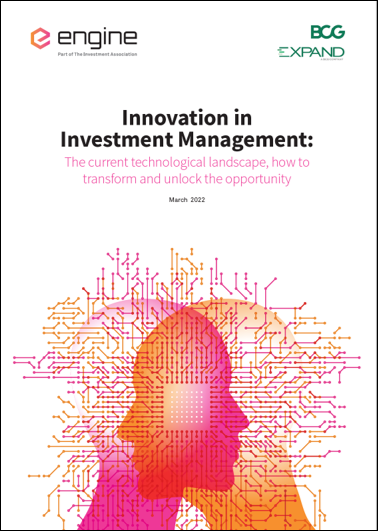Research
Innovation in Investment Management: The current technological landscape, how to transform and unlock the opportunityThe Investment Association and Engine, Expand Research and Boston Consulting Group (BCG)
(This article contains links to other websites – all links will open in a new tab)
The Investment Association and Engine are delighted to have partnered with Expand Research and Boston Consulting Group (BCG) on a report looking at innovation in investment management. (download full report)
The last couple of years have seen the global economy focus on tech and digitisation in order to meet shifting client requirements and business needs. We are proud the UK remains one of the largest and most diverse centres of investment management in the world, second only to the US with total UK assets under management (AUM) reaching £9.4 trillion by the end of 2020, an impressive increase of 11% year-on-year.
The UK is a country of entrepreneurs, innovators and implementers. The UK’s position as a global leader in FinTech is a great strength. Global total capital investment into FinTech was in excess of $102 billion in 2021, a 183% increase from 2020 and indeed last year the UK
FinTech sector leapt forward with over 217% year-on-year investment growth reaching $11.6 billion more than the next five European countries combined. There is, however, no room for complacency.
An impressive 2,500 FinTechs have made the UK their home with a growing number seeing investment management as an opportunity to redefine existing processes and business models, benefiting from access to a global market, global talent and global connectivity.
We hope this report will provide a useful and accessible overview of the dynamic innovation landscape, areas of focus and priorities as well as key requirements to unlock the transformative opportunities within investment management.
For more information on the work of Engine and how to get involved please visit theiaengine.com
Innovation has become increasingly important within investment management throughout the last decade. This has been driven by a need to deliver the cost efficiency and competitive advantage required to combat margin pressures.
While the financial services sector is not short of innovators, investment managers have historically been conservative in their approach and slow to evolve due to the weight of legacy infrastructure, culture, and processes.
In recent years, more frequent examples of successful FinTech collaboration and deployment within investment managers has led to an increased openness to change.
While many in the industry remain risk-averse, more firms have become willing to cooperate with smaller FinTechs, mobilise innovation hubs, and drive new capabilities through third party expertise. The landscape has changed from simple buy versus build to much broader strategic partnerships with mutual benefits that transcend transactional relationships.
The benefits for firms who engage more openly with the FinTech community extend beyond simply adding new platforms and tools. The expertise of FinTechs can often engender a shared learning environment for both vendor and client, passing on valuable skills and knowledge in areas such as artificial intelligence, agile, data science and advanced analytics. These are skillsets which are difficult and costly to recruit for within investment management.
FinTechs can also provide commercial opportunities for investment managers who wish to take a stake in their operations. The mechanics of these commercial opportunities can be varied, ranging from cooperation on a platform’s development within the technology stack to full acquisition.
Despite the apparent benefits, barriers to entry for smaller FinTechs still remain significant. Among the most challenging of these are the obstacles put in place by procurement, InfoSec and risk functions. The lead time for closing commercial deals is long for small firms trying to meet cash flow requirements, and the provision of information for purposes of due diligence can be onerous and time consuming.
Other challenges for FinTechs include grappling with their client’s legacy infrastructure along with extensively siloed data, both structured and unstructured, as well as effectively publicising their products in a crowded marketplace.
These obstacles are far from insurmountable, and so the inexorable rise of FinTechs continued at pace in 2021, a community which includes an expanding catalogue of well-known subcategories (e.g. RegTech, WealthTech). The backdrop of a continuing global pandemic has, in places, sharpened the focus of investment managers when it comes to the importance of a tech-focused and digitised operating model.
The SME Forum is pleased to provide this report to you on behalf of The Investment Association, Engine, Expand Research and Boston Consulting Group (BCG)
About IA Engine
Engine is a wholly owned subsidiary of the Investment Association supporting the adoption of technology within investment management, for the benefit and changing needs of consumers. It is a buyside focused technology hub and accelerator providing connectivity, access and education both nationally and internationally through focused programmes and outreach.
Launched in October 2018 Engine remains the only buyside focused hub of its kind globally and actively works with over 150 FinTech solution providers and the investment management sector.
About Expand Research / Boston Consulting Group
Expand, a Boston Consulting Group company, enables the development, validation and execution of better operational strategies. They empower organisations to grow, compete and operate with.
